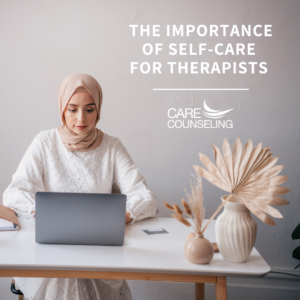Importance of Self-Care for Therapists
 Caregivers and helping professionals spend a lot of time and energy caring for others. If you don’t take care of yourself, it is difficult to be fully present and give the best care to others.
Caregivers and helping professionals spend a lot of time and energy caring for others. If you don’t take care of yourself, it is difficult to be fully present and give the best care to others.
For therapists, one of the most important tools is self-therapist and good self-care. We care for our clients and their well-being. Suicide, physical and sexual abuse, grief, and loss are examples of areas that may trigger compassion fatigue due to the emotional, physical, and psychological impact. This is different from burnout, as burnout also encompasses physical and emotional fatigue but from overextension. Those who are experiencing burnout are often impacted by many other factors that may be lacking or limited such as pay, benefits, work-life balance, training, support, and supervision.
In the field of mental health, compassion fatigue, and burnout could lead to professional impairment and negatively impact clinical work. Taking good care of oneself may be viewed as an ethical obligation as understood by regulating bodies in mental health. Taking a proactive approach to prevention and engaging in self-care practices for coping are key.
CARE Counseling is aware of the issue of burnout within the field. CARE’s mission is “Building a Community to Strengthen the Community” which is reflected in core values such as work hard play hard. The mission informs factors of self-care that are important for well-being including flexibility, compensation, benefits, monthly trainings, weekly supervision and consultation to reflect on self-as-therapist, learning goals that incorporate self-care, and a supportive community.
A literature review article for mental health practitioners by Kirsten Posluns and Terry Lynn Gall looked at the role of self-care in the well-being of therapists, which included many of these same factors: awareness, balance, flexibility, physical health, social support, and spirituality. They also looked at studies that examined the prevalence of compassion fatigue and burnout.
In one study, 13% of behavioral health providers were at risk of compassion fatigue or burnout (Sprang et al. 2007). Additional support for beginning therapists and self-care can be integrated into training as 49% of counseling or clinical trainees reported experiencing burnout (Kaeding et al. 2017).
Here are strategies of focus for self-care, based on the findings of the literature review:
Awareness
Recognizing burnout and compassion fatigue among counselors is very important. Be aware of the signs. Take time for self-reflection. Check-in with yourself and others. Name it. For example: “I am noticing feeling more ____ lately”. I recognize ____ and the need for _____. I plan to _____”.
Balance
Create work-life balance. Be available for a holistic, balanced approach to well-being. Engage in enjoyable activities and relationships outside of work.
Flexibility
Psychological flexibility and mindset when working with challenges are important. Striving for excellence rather than perfection, learning through mistakes, and having a growth mindset is important, especially for new therapists.
Physical Health
Prioritizing sleep, healthy eating, and regular exercise are essential foundations for self-care as the physical impacts of stress such as fatigue, and headache can be improved by taking care of the body.
Social Support
Utilize social supports including peers, supervisors and supervisors, family, and friends. Seeking your own personal therapy is recommended.
Spirituality
Connecting with God, a higher power, being one with nature, engaging in mindful meditation such as a loving-kindness or self-compassion meditation, finding support within a spiritual community, and utilizing prayer is great for coping.
Click here for strategies you can try for coping with work stress: https://positivepsychology.com/self-care-therapists/
Here are some great self-care resources for counselors provided by the American Counseling Association (ACA).
Written By: Charlotte Johnson, MA, LPCC



























